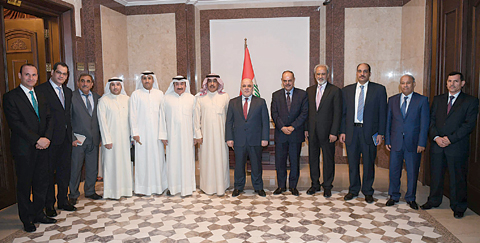 BAGHDAD: Iraqi Prime Minister Dr Haidar Al-Abadi meets a delegation of Kuwaiti journalists. —KUNA
BAGHDAD: Iraqi Prime Minister Dr Haidar Al-Abadi meets a delegation of Kuwaiti journalists. —KUNABAGHDAD: Iraqi Prime Minister Dr Haidar Al-Abadi praised deep-rooted Iraqi-Kuwaiti relations, describing them as "distinguished and exemplary" and expressing his pride in these relations. Abadi said during a meeting Monday night with a delegation of Kuwaiti journalists, which is on a visit to the Iraqi capital, that relations between the two countries have moved from the status of litigation because of the former regime's policy, to understanding, harmony and fraternal relations between the two neighboring countries, and "our government looks forward to further cooperation".
He said the vision of the Iraqi government is that the region cannot be developed without cooperation and overcoming the divisions of the past, and "we ought to resolve these problems and work on developing our relations in other areas of cooperation and to keep small differences aside".
"We look at our differences with Kuwait through the framework of brotherhood and cooperation," Abadi said, adding that resolution of many of the disputes is hindered by red tape at state institutions. He said that Iraq had gone through a transitional stage after the collapse of the state in 2003 and now it is exposed to abnormal terrorist attacks from gangs boasting of killing and terrorizing citizens that are fed by sectarian polarizations, adding that "we are achieving victories over them and are able to liberate our lands from them".
Global threat
Abadi pointed out that the so-called Islamic State (IS) or 'Daesh' is a threat posed against all countries in the world, so the help of the international community is needed in order to eliminate such a threat. He said many of those who are fighting with terrorist groups in Iraq come from abroad, "and we are now indulged in fierce fighting with terror and we are closer to achieving the final victory through Mosul and the Syrian border operations."
The premier said that "with Syria, we want to deal with state institutions rather than armed groups to control the borders", pointing out that any partition of Syria is a serious matter and "it will be a tragedy and another challenge for us."
He said the real problem in the liberation of Mosul is the humanitarian aspect due to the population density, a matter that makes it a difficult task for the Iraqi army to carry out its humanitarian mission. He said he was optimistic for the next stage, and such optimism lies in cooperation and coordination with each other in order to maintain mutual interests.
Abadi pointed out that Iraq shares a very long border with Iran, "and we have interests with it and we are not prepared to enter any war, since war destroys people and infrastructure". On the issue of foreign control of Iraqi decisions from outside, the premier said that there is no state that is immune from outside influence, noting that each country has interests beyond its borders and "we try to maintain these interests to our advantage."
New page
Meanwhile, Iraqi Foreign Minister Ibrahim Al-Jaafari said Kuwait has gained Gulf, Arab and worldwide weight and with its cooperation with Iraq and the rest of Arab and non-Arab countries, and a new page of diplomatic relations for the good of the region and the world can be drawn.
Jaafari said during a meeting on Monday night with the Kuwaiti media delegation that the Kuwaiti aid to the Iraqi people is a 'letter of gratitude' from the Kuwaiti people to their Iraqi counterparts, and that Kuwait's positions are always the focus of pride for all Iraqis. He pointed to the great support provided by HH the Amir Sheikh Sabah Al-Ahmad Al-Jaber Al-Sabah for Iraq and his announcement during the 27th Arab summit hosted in the Mauritanian capital Nouakchott about Kuwait's intention to hold a donors conference for Mosul.
He said Iraq will not forget those who stood with it and helped it in these special circumstances, indicating that Iraq is actually in need for such support for the construction of hospitals, schools and others. He added that the Iraqi and Kuwaiti media have a great responsibility to shoulder at this time and must be the kind of media that investigate facts, come up with studies, recommendations and criticisms while offering solutions. He described Kuwaiti media as diverse, brave and having a good culture, and is considered a window on all political, economic, cultural and other aspects.
Corruption
Jaafari said Iraq is suffering from administrative corruption, bureaucracy and administrative monotony, which drive investors away despite the presence of very large investment opportunities in Iraq following a series of wars, stressing that Iraq possesses abundant oil, agricultural, water and tourism wealth. He pointed out that neighboring countries are welcome to invest in Iraq, a matter that would strengthen ties between these countries and Iraq that were affected by the previous regime.
He said that the security situation drives tourists away from Iraq despite the variety of tourist attractions, stressing that the government is working seriously and intensively to fight administrative corruption, in addition to restoring security in Iraq, a matter which is noticed by everyone as security has improved a bit.
He added that the real infrastructure of national security and economy is the culture, saying that everything in the community, whether good or bad, reflects on the culture of the country, stressing that Iraqis do not have the culture of division or separation, adding that all partition attempts would be faced by Iraqis' unity, pointing out that this concern does not exist as before.
The Kuwaiti delegation included President of Kuwait Journalists Association Adnan Al-Rashid, Deputy Director General for the Editorial Sector and Editor-in-Chief of Kuwait News Agency (KUNA) Saad Al-Ali and head of the local section of Kuwaiti daily Al-Qabas Ibrahim Al-Saidi. Also present was Kuwait's Ambassador to Iraq Ghassan Al-Zawawi and other diplomats. - KUNA










